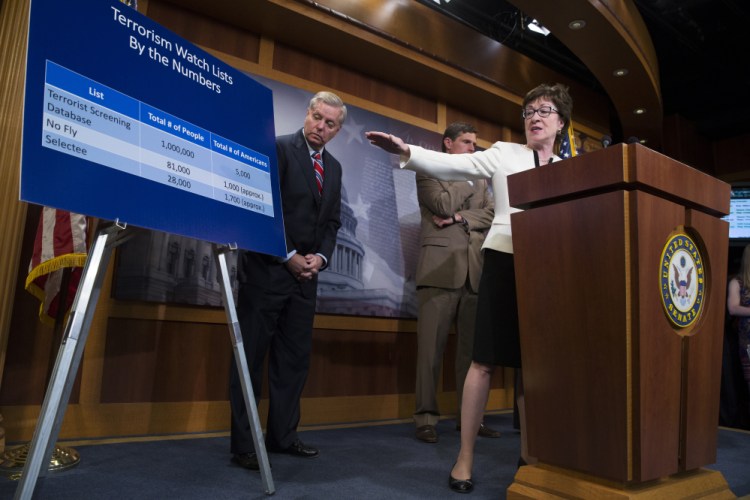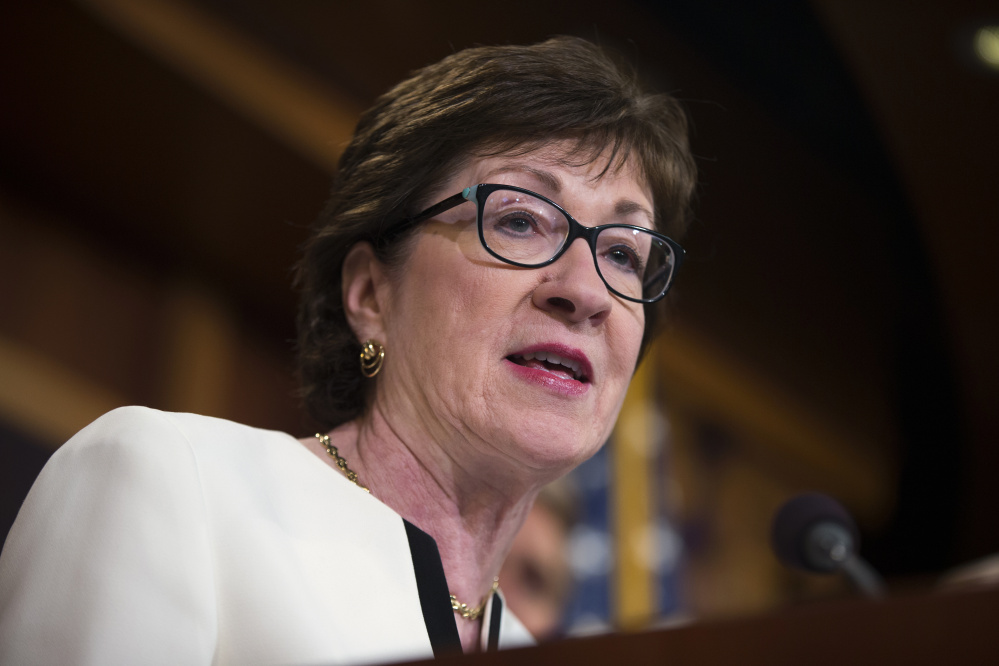Maine’s Sen. Susan Collins rolled out a bipartisan group of Senate supporters Tuesday for a compromise gun control measure that would prohibit any person on either of two federal terrorism watch lists from buying firearms.
The group called the bill a viable alternative to the four gun control measures that failed to win the 60 votes needed for approval in the Senate on Monday. It comes a little more than a week after 49 people were shot to death at a Florida nightclub by a gunman who vowed allegiance to the Islamic State terrorist group before being killed by police. The shooter had been previously identified and interviewed by the FBI, and had been on terrorism watch lists, but was not under investigation at the time of the attack.
“Essentially, we believe that if you are too dangerous to fly on an airplane, you’re too dangerous to buy a gun,” said Collins, a Republican. Collins said she and those who worked on the proposal and joined her Tuesday – three Republicans, four Democrats and Maine Sen. Angus King, an independent – support different versions of gun control legislation, but “all of us are united in our desire to getting something significant done on this vital issue.”
Collins’ proposal would prohibit those on the federal “no-fly” and “selectee” lists from purchasing a firearm. Those on the selectee list are allowed to fly after intensive screening. The bill includes a five-year look-back provision to alert the FBI to gun purchases by someone who had been on the broader Terrorism Screening Database, and would allow anyone on the lists who is prohibited from buying a gun to appeal.
The proposal would affect about 2,700 Americans currently on the two lists.
Senate Majority Leader Mitch McConnell, R-Ky., said he would allow a vote on the proposal, but he has not endorsed it. Collins said her proposal would likely come up for a vote this week or next.
The package seemed to face an uphill climb for the 60 votes it would need in the Senate, and likely faces stronger opposition in the House. Opponents include the National Rifle Association and Gun Owners of America.
Democrats have said about 20 Republican votes are needed for Collins’ proposal to have a chance of passing, and that is a bar that no one is sure they can clear, The Washington Post reported.
Senate Democratic Conference Vice Chair Charles Schumer, D-N.Y., said Tuesday that Collins’ proposal is “a step in the right direction” but that it also has “some serious problems.”
He argued that by focusing on the two smaller lists, hundreds of thousands of other suspected terrorists could slip through the cracks. He also said that the expedited appeals process for anyone believing they were mistakenly denied a gun is too fast, according to the Post.
GRAHAM: ‘THIS SIMPLY MAKES SENSE’
On Monday, Sen. Dianne Feinstein, D-Calif., who authored one of four bills that failed in the Senate this week, said Collins’ proposal is “not enough to close the loophole that creates this terror gap.”
But Sen. Lindsey Graham, R-South Carolina – one of the Senate’s most conservative lawmakers, a staunch defender of 2nd Amendment rights and the owner of an AR-15, a military-style, semi-automatic rifle similar to the weapon used in the Florida massacre – said he had no objection to Collins’ proposal.
“This simply makes sense to me,” said Graham. “If we can’t pass this, it truly is a broken system up here.”
If somebody was mistakenly put on either list and prevented from buying a gun, that can be corrected. But if a person on either list purchases a gun and uses it to kill people, that can’t be fixed after the fact, Graham said. He said he understands that Americans’ constitutional rights to own firearms must be protected.
“But every right has boundaries on it,” Graham said.
King, who sits on the Senate Intelligence Committee with Collins, said security and intelligence officials have warned that the next round of terrorism is likely to be staged by “lone wolf” operatives already in the U.S. and other Western nations. He said the bill makes sense given how hard the U.S. military is working to subdue terrorist groups in Iraq, Syria and other parts of the globe.
“What sense does it make that ISIS can mobilize people in this country and they can walk into a store and buy a gun?” King asked. He called the issue a “major gap” in the nation’s security system.
Even if Collins’ bill passes, a terrorist could still purchase a firearm in many states, including Maine, where background checks are not required for some gun sales, King said. He called Collins’ bill “good old Maine common sense,” and that “the fundamental purpose of any government is to provide for the common defense.”
Collins said she was taking her cues from the American people, who she says overwhelmingly support prohibiting those on no-fly lists from purchasing a firearm. Collins said she did not consult the National Rifle Association.
BACKGROUND CHECK MEASURE IN MAINE
With Collins on Tuesday were King, Graham and Sens. Heidi Heitkamp, D-North Dakota, Kelly Ayotte, R-N.H., Martin Heinrich, D-New Mexico, Jeff Flake, R-Ariz., Tim Kaine, D-Va., and Bill Nelson, D-Fla.
Nelson called an AR-15 a “killing machine” and said not denying weapons to suspected terrorists “defies common sense.” He also said he owed it to the people of Orlando to pass legislation to help keep guns from terrorists.
A ballot question on whether to require background checks for private gun sales will appear on the November ballot in Maine. Currently only licensed firearms dealers are required to perform background checks on their customers.
David Trahan, a former state lawmaker and the executive director of the Sportsman’s Alliance of Maine, which is opposing the background check ballot measure, said he wouldn’t criticize Collins’ efforts, but urged federal lawmakers to proceed with caution.
“I think we all would be sympathetic to an initiative that would keep guns out of the hands of terrorists,” Trahan said. But he also said that in the case of the Orlando nightclub killings, the FBI had multiple interactions with the man suspected of the shootings. He said a gun shop owner also called authorities about Omar Mateen, the man police have identified as the shooter, before the killing spree.
“All of the right things were done to identify this man,” Trahan said. “But what was missing was the mechanism from the report to the investigation that might have stopped him, not what type of firearm was used in the crime. Right now the failures in the system seem to be sitting on the door of the FBI. Flags went up all over the place that said this guy was dangerous.”
Scott Thistle can be contacted at 791-6330 or at:
sthistle@pressherald.com
Copy the Story LinkSend questions/comments to the editors.




Success. Please wait for the page to reload. If the page does not reload within 5 seconds, please refresh the page.
Enter your email and password to access comments.
Hi, to comment on stories you must . This profile is in addition to your subscription and website login.
Already have a commenting profile? .
Invalid username/password.
Please check your email to confirm and complete your registration.
Only subscribers are eligible to post comments. Please subscribe or login first for digital access. Here’s why.
Use the form below to reset your password. When you've submitted your account email, we will send an email with a reset code.